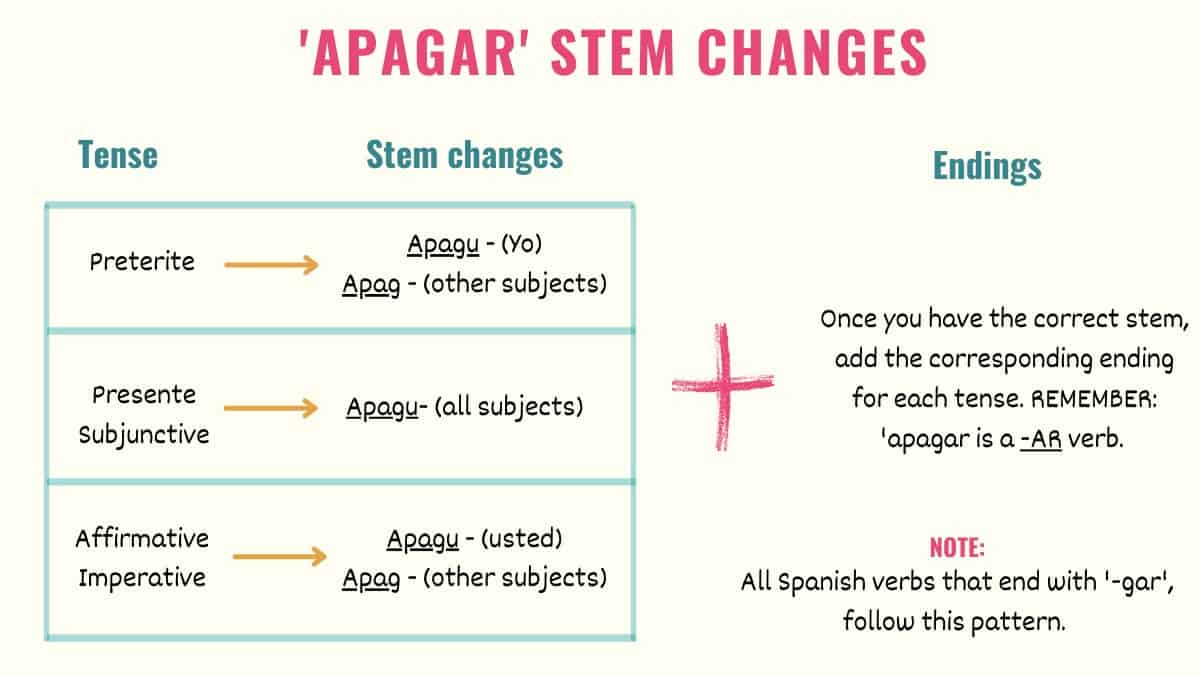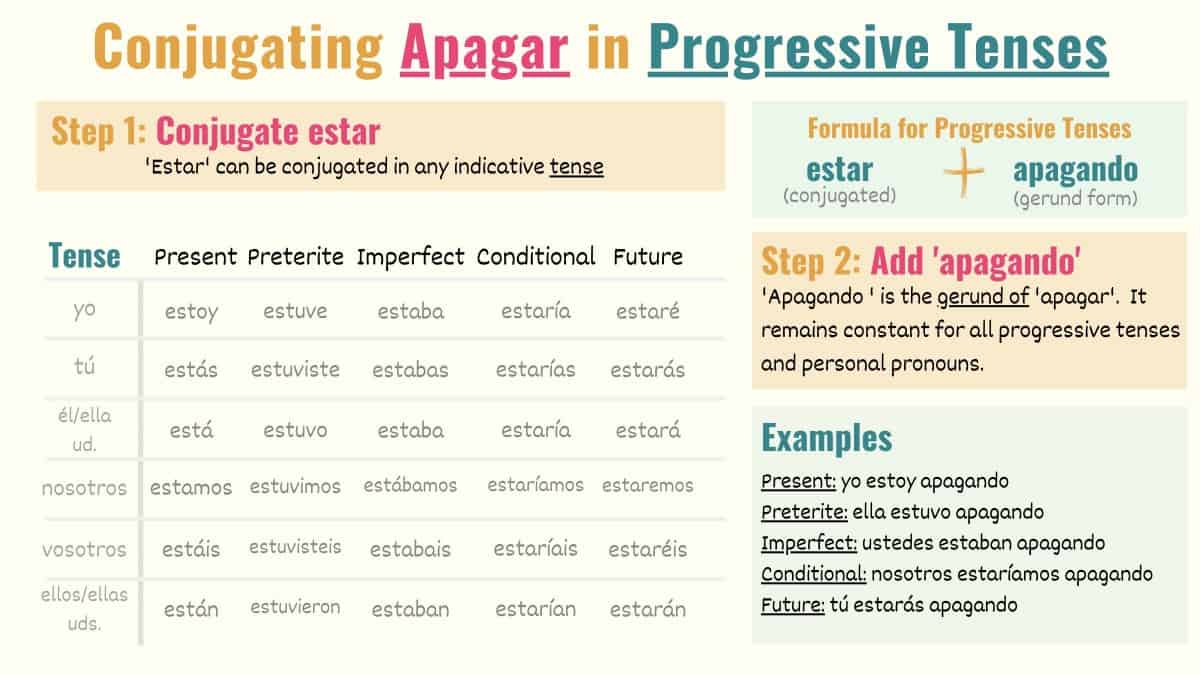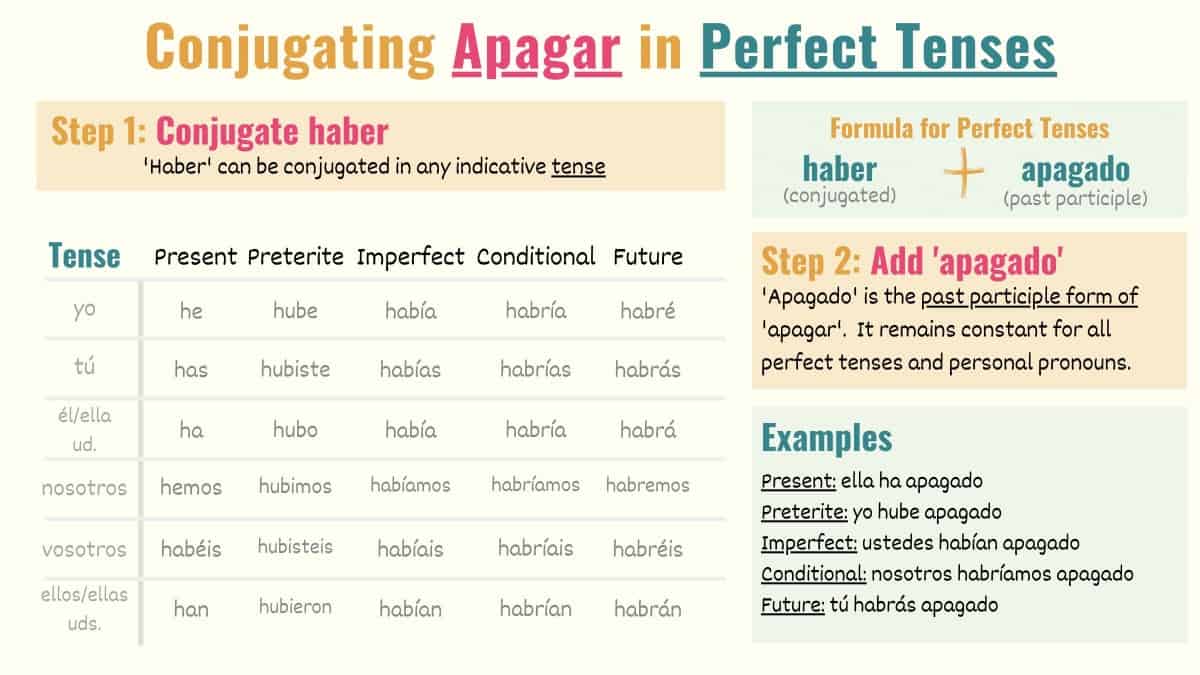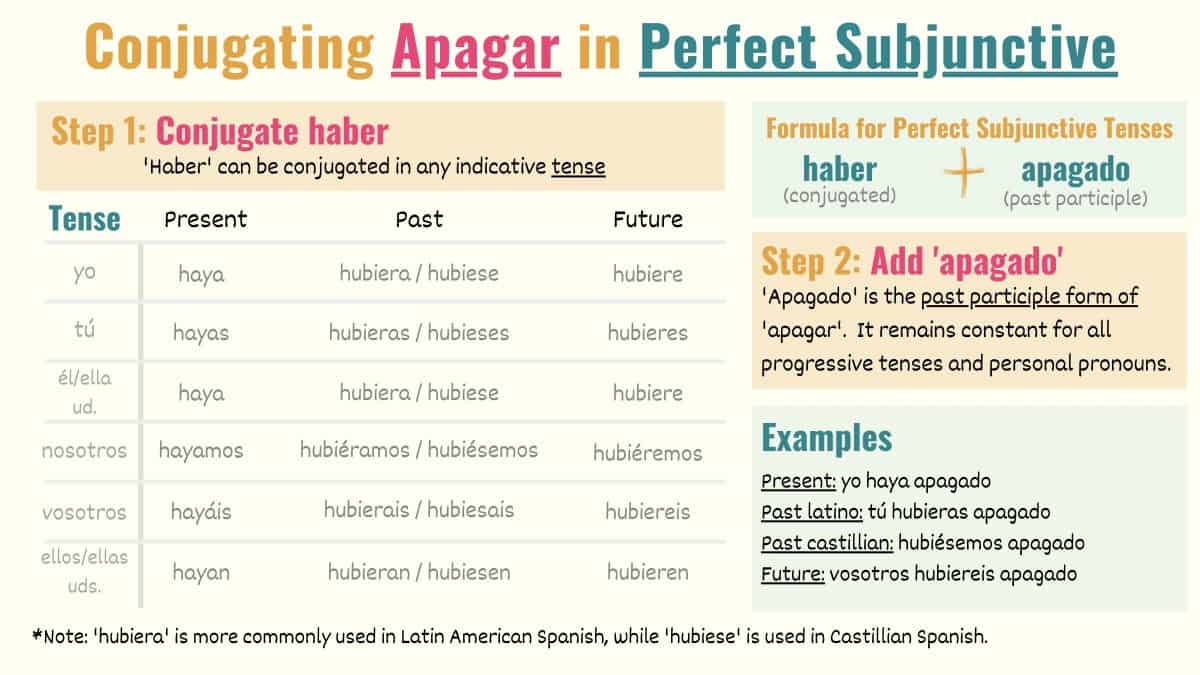In this short guide, we will cover the following topics for ‘apagar’ in Spanish:
- What does ‘Apagar’ mean?
- Apagar Conjugations
- How to Use ‘Apagar’ in Spanish
- Expressions & Idioms with ‘Apagar’
- Synonyms of ‘Apagar’ in Spanish
What does ‘Apagar’ mean?
Definition – In Spanish, the verb ‘apagar’ means ‘to turn off’, ‘to shut down’ or ‘to switch off’. As a result, this verb is used to describe that a device, or even lights, stopped working because they were shut down.
This verb can also be used to express that a fire (or something that is burning) has been extinguished. Therefore, in this situation, ‘apagar’ means ‘to put out’, ‘to blow out’ or ‘to extinguish’.
‘Apagar’ Conjugations
When it comes to conjugating apagar, you’ll notice that, overall, this is a regular verb. However, in order to keep the soft sound of the ‘g’, apagar will have some small irregularities in preterite (for ‘yo’) and the present subjunctive (for all subjects). These changes are applied to all verbs that end with ‘-gar’.

Below are some conjugation charts to better explain how to conjugate ‘apagar’ in Spanish for the most commonly used tenses.
Get a Step-by-Step Map to Learning Spanish
Join the Tell Me In Spanish community and get a copy of my step-by-step Spanish Learner’s Roadmaps and tricky synonyms & vocab cheat sheets.
Indicative
Present tense conjugation
Apagar in the present tense is a regular verb. This means that to conjugate you’ll use the stem ‘apag’ and will add the corresponding endings for each person.
| Person | Conjugation | Translation |
|---|---|---|
| Yo | apago | I turn off |
| Tú | apagas | You turn off |
| Él / Ella / Usted | apaga | He/She turns off |
| Nosotros | apagamos | We turn off |
| Vosotros | apagáis | You turn off |
| Ustedes / Ellos / Ellas | apagan | They/You turn off |
Preterite tense conjugation
In order to keep the pronunciation of the verb (soft g), ‘yo’ has a small irregularity in the stem. Note that in this case you’ll use apagu to preserve a consistent sound across all the subjects. Don’t forget to add the corresponding endings for each person.
| Person | Conjugation | Translation |
|---|---|---|
| Yo | apagué | I turned off |
| Tú | apagaste | You turned off |
| Él / Ella / Usted | apagó | He/She turned off |
| Nosotros | apagamos | We turned off |
| Vosotros | apagasteis | You turned off |
| Ustedes / Ellos / Ellas | apagaron | They/You turned off |
Imperfect tense conjugation
Given that the endings for imperfect start with an ‘a’, with this tense apagar doesn’t have irregularities. This means that you’ll use the stem ‘apag’ and add the proper endings.
| Person | Conjugation | Translation |
|---|---|---|
| Yo | apagaba | I turned off |
| Tú | apagabas | You turned off |
| Él / Ella / Usted | apagaba | He/She turned off |
| Nosotros | apagábamos | We turned off |
| Vosotros | apagabais | You turned off |
| Ustedes / Ellos / Ellas | apagaban | They/You turned off |
Future tense conjugation
To conjugate ‘apagar’ in the future tense, you’ll just add the corresponding endings (underlined in the table below) to the infinitive form.
| Person | Conjugation | Translation |
|---|---|---|
| Yo | apagaré | I will turn off |
| Tú | apagarás | You will turn off |
| Él / Ella / Usted | apagará | He/She will turn off |
| Nosotros | apagaremos | We will turn off |
| Vosotros | apagaréis | You will turn off |
| Ustedes / Ellos / Ellas | apagarán | They/You will turn off |
Conditional tense conjugation
| Person | Conjugation | Translation |
|---|---|---|
| Yo | apagaría | I would turn off |
| Tú | apagarías | You would turn off |
| Él / Ella / Usted | apagaría | He/She would turn off |
| Nosotros | apagaríamos | We would turn off |
| Vosotros | apagaríais | You would turn off |
| Ustedes / Ellos / Ellas | apagarían | They/You would turn off |
Progressive Tenses

Katia y Daniela están apagando las velas
Katia and Daniela are blowing the candles out
Cuando llegué, ustedes estaban apagando las luces
When I arrived, you guys were turning the lights off
Perfect Tenses

Ya hemos apagado todo
We have already turned everything off
Dicen que mañana habrán apagado el fuego
They say that tomorrow they’ll put the fire out
Apagar Subjunctive Conjugations
Present subjunctive conjugation
Apagar in the present subjunctive changes its stem to apagu. We do this to keep a soft sound when using ‘g’ (remember that in Spanish this letter has a hard and soft sound). Aside from this, you just need to add the endings for the present subjunctive (underlined in the table below).
| Person | Conjugation | Translation |
|---|---|---|
| Yo | apague | I turn off |
| Tú | apagues | You turn off |
| Él / Ella / Usted | apague | He/She turns off |
| Nosotros | apaguemos | We turn off |
| Vosotros | apaguéis | You turn off |
| Ustedes / Ellos / Ellas | apaguen | They/You turn off |
Imperfect subjunctive conjugations
To conjugate apagar in the imperfect subjunctive, use the stem apag and add the endings for this tense.
| Person | Conjugation | Translation |
|---|---|---|
| Yo | apagara / apagase | I turned off |
| Tú | apagaras /apagases | You turned off |
| Él / Ella / Usted | apagara / apagase | He/She turned off |
| Nosotros | apagáramos / apagásemos | We turned off |
| Vosotros | apagarais / apagaseis | You turned off |
| Ustedes / Ellos / Ellas | apagaran /apagasen | They/You turned off |
Perfect subjunctive

¡Hubieran apagado la televisión! Nadie la está viendo
You should have turned the tv off! Nobody is watching it
Si hayas apagado la estufa, la casa no se habría incendiado
If you had turned off the stove, the house wouldn’t have caught fire
Imperative
Imperative conjugation
Given that most of the imperative endings start with ‘a’, you’ll use the regular stem apag for most subjects. However, notice that for usted and ustedes the imperative ending starts with ‘e’. Meaning that, in order to keep the same sound, you’ll use apagu only for this person.
| Person | Conjugation | Translation |
|---|---|---|
| Tú | Apaga | Turn off |
| Nosotros | Apagamos | Let’s turn off |
| Vosotros | Apagad | Turn off |
| Usted/Ustedes | Apague/Apaguen | Turn off |
Take Note: To create the negative imperative, you need to follow the conjugations for the present subjunctive (apague, apagues, etc.). Like any other Spanish negative sentence, just add the word No before the verb.
No apagues la estufa, voy a seguir cocinado
Do not turn the stove off, I will keep cooking.
How to Use ‘Apagar’ in Spanish with Examples
- To make an appliance, light or device to stop functioning.
- To say ‘to extinguish’ or ‘to put out’
In the sections below, we’ll go into more detail about how to use this verb. I’ll provide you with examples and a formula that you can use to practice and create your own sentences.
To make an appliance, lights or device to stop functioning
In Spanish, we use apagar to describe that appliances, machines, devices, or something that produces light or works with power was turned off, interrupted or stopped working. As a result, in this situation, ‘apagar’ can be translated as ‘turn off’, ‘shut down’ or ‘switch off’.
Below there is a phrase structure that you can follow. Notice that the noun describes the object that you or others are turning off.
[Apagar conjugated] + [determiner] + [noun]
¡Apaga la luz! Vas a despertar al bebé
Turn the light off! You’re going to wake the baby up
Si apagas tu teléfono, no podrás recibir llamadas
If you turn your phone off, you won’t be able to receive calls
Oigan, ¿apagaron las computadoras? Se van a calentar
Hey, guys, did you shut the computers down? They’re going to overheat
Me dijo que no apagara la lámpara porque quiere seguir leyendo
She told me not to turn the lamp off because she wants to keep reading
To say ‘to extinguish’ or ‘to put out’
In Spanish, we also use apagar to describe that a fire was suffocated or that something stopped burning. In this case, it can be translated as ‘put out’ or ‘to extinguish’.
[Apagar conjugated] + [complement]
Los bomberos apagaron a tiempo el incendio
Firefighters extinguished the fire in time
Apaga tu cigarro, está prohibido fumar
Put out your cigarette, smoking is prohibited
Apaguemos la fogata antes de dormir
Let’s put out the campfire before going to sleep
¿Ya apagaron las velas?
Did you guys already put the candles out?
Apagar Expressions & Idioms
There are different expressions with the verb ‘apagar’ that can help you communicate and improve your conversational skills in different scenarios. To avoid misunderstandings, make sure you understand their meanings and when to use them.
Apagar la sed: It means ‘to quench thirst’. In Spanish it is used in both formal and informal contexts. A popular variation of this phrase is calmar la sed.
Sentirse apagado: It can be translated as ‘to feel down’. This phrase is used to describe lack of energy, strength or motivation. Sentirse apagado also describes feelings of sadness. It’s usually more suitable in informal conversations.
Synonyms of ‘Apagar’ in Spanish
Extinguir: This verb is a more formal synonym of ‘apagar’ when talking about extinguishing a fire. It means ‘to put out’ or ‘to extinguish’.
Sofocar: It means to extinguish or subdue a spreading or developing thing, especially a fire. In this case, it can be translated as ‘to suffocate’ or ‘to put out’.
Aplacar: It means ‘to appease’ or ‘to calm down’. In Spanish, it is often used when talking about something, especially a feeling, that loses intensity. In this case, it can be used in both formal and informal contexts.
Related Resources
How to pronounce letter ‘G’ in Spanish



